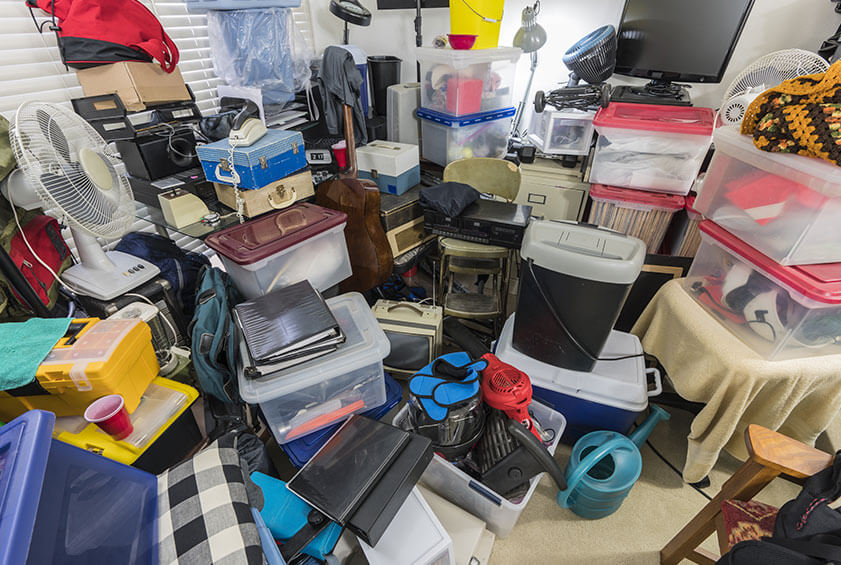If you’ve caught even one episode of A&E’s “Hoarders”, you’re probably already familiar with at least some of the signs of hoarding disorder. Hoarding can be a problem for people of any age, but older adults tend to be particularly susceptible. Though individuals in their mid-teens have been known to hoard things, “baby boomers” presently account for the highest population of hoarders. If you’re wondering who hoards more, male or female, it’s pretty equal (but a bit more on the female side). Of the adult population, approximately 2 to 5% exhibit behaviors consistent with hoarding.
Are you worried that your aging loved one has a hoarding disorder? Does their home need to look like those on the television show “Hoarders”? No. There are early signs that could point to someone being or quickly becoming a hoarder. There are also treatments to help overcome/manage the condition.
Let’s take a look at hoarding and some of the early signs that might point to your loved one having a hoarding disorder, and then briefly touch on possible treatments.
What Is Hoarding?
Technically, hoarding is considered a mental disorder of sorts. Whether they are worth anything or not, when a large number of items is being kept by someone, that is hoarding. What might someone “collect”? Here are just a few things:
- An excessive number of animals
- Clothing
- Household goods
- Outdated small appliances/electronics
- Paper products
- Magazines
- Containers
- Food
- Newspapers and much, much more
What causes hoarding? Medically speaking, hoarding may be caused by altered serotonin levels, environmental factors, OCD, stress, genetics, altered brain connections, and more. Additionally, hoarding may be the result of someone having difficulty coping with or trying to handle a particularly stressful life event. Examples would be losing their possessions to a fire, divorce, the death of a loved one, etc.
Signs and Symptoms of Hoarding
Watch for these signs and symptoms if you think someone may have a problem with hoarding disorder.
Your loved one may have a problem with hoarding if:
- They won’t let you borrow or touch their possessions.
- Their garage or home is already overflowing and/or they rent at least one storage unit in which to put more “stuff”.
- They constantly insist they meet you at an event or at your home (rather than at their place).
- Their home is in need of repair, but they keep putting off making an appointment.
- They resist storing things out of sight and have trouble finding things.
- Because of compulsive shopping, they have fallen into debt.
- They have numerous bills that are past due.
- It would be a major undertaking to de-clutter even a small area, and it would take hours if not days to do so.
- Their “stuff” is a constant source of discussion and/or disagreement.
- They keep the curtains constantly drawn and parts of their home off-limits.
Treatments for Hoarding
One of the difficulties in treating hoarding is that comfort is frequently offered by the animals or possessions the hoarder has collected. They can react with anger and frustration if these items are taken away. To fill emotional needs, they may quickly collect more.
To date, the FDA (Food and Drug Administration) has not approved any medication specifically for the treatment of hoarding. That said, current medications being used to treat depression and anxiety may be used (think SSRIs). Research continues in this area.
Talk therapy, or psychotherapy, is the primary treatment for hoarding disorder.
Discovery Village At Southlake Provides a Healthy Living Environment
Do you need to provide a healthier living environment for your aging loved one? See what Discovery Village At Southlake has to offer.
Remember, living in a senior living community doesn’t only mean assisted living and memory care. We offer a superb independent living lifestyle, as well. Assure your loved ones that they can experience numerous opportunities for socialization and full enjoyment of their golden years in our community.
Better yet, schedule a free tour so that you can both see, for yourselves, all that Discovery Village At Southlake has to offer. While you’re here, enjoy a chef-prepared lunch on us. It’s just our way of saying, “Thanks for considering Discovery Village At Southlake.” If you just have a question or two, feel free to contact us at 682–253–8966.







